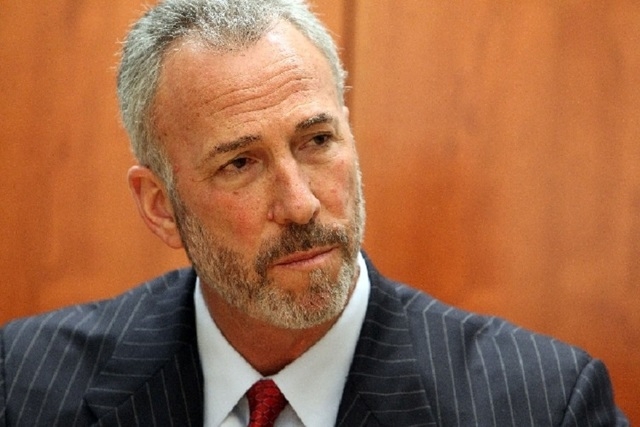DA pledges to change witness payment policy
The Clark County district attorney’s office reversed course Friday and pledged to alert defense lawyers when it pays witnesses who testify against people they represent.
The DA’s announcement follows a Review-Journal investigation that showed prosecutors have been helping out witnesses — in some instances paying them more than $1,000 — for nearly ten years.
The Clark County public defender’s office as well as Las Vegas private attorneys contacted by the Review-Journal were stunned to learn the DA’s office had a checking account to pay witnesses and had done so in some of their cases. The American Civil Liberties Union of Nevada and the public defender’s office have called for the state attorney general to launch an investigation into the practice.
District Attorney Steve Wolfson told the Review-Journal earlier in August that defense attorneys may have felt left in the dark about the practice because the majority of cases didn’t go to trial. He contended his office didn’t have to disclose the payments until trial, which further outraged the public defender’s office and the ACLU.
Now, Wolfson is making a policy change.
“Though the fund has been little used, it has been helpful in ensuring that victims and witnesses in violent criminal cases such as murders, sexual assaults and domestic violence have the ability to attend court proceedings so that criminals can be put behind bars,” Wolfson said Friday in a press release.
The shift comes a day after the public defender’s office asked a judge to overturn a conviction in a high-profile murder case after a rent payment wasn’t disclosed to the defense even at trial. The court filings contend the case should be tossed due to “systematic prosecutorial misconduct.”
Public defenders say key witnesses changed their stories after the payment and defense attorneys were at a loss to figure out their motivation for telling police one thing and the jury another.
The two witnesses in that case were victims of a brutal machete attack that left their mother dead.
The Review-Journal has identified only one instance in which a payment was disclosed at trial.
According to Friday’s release from the DA, the change in the policy says: “The office will be disclosing to all defendants, through their attorneys, instances in which the fund has been or will be used to provide assistance, whether cases proceed to trial or not. Additionally, disclosure will be made as far back as the District Attorney has maintained records (2005).”
The Review-Journal found that since December 2004 the DA’s office authorized 68 payments from a checking account maintained by its Victim/Witness Assistance Center, which coordinates witness travel, updates victims on case statuses and refers victims to outside help. Most were for help with rent, but they included a cellphone bill, a passport fee, bus passes and high school computer class costs.
It’s unclear how many cases are involved or if payments were limited to victims and those related to their well-being. The district attorney’s office redacted case numbers and other information from records obtained by the Review-Journal.
The DA’s office said it made 56 payments to victims or witness payments since 2004, with 49 for rent relocation assistance. The rest were classified as for “other uses.”
The district attorney’s office count does not include voided payments. The Review-Journal’s analysis does. In one instance of a voided payment, the victim did not pick up a check that was needed for “emergency” rent, according to public records.
Payments were not made directly to witnesses, but to the landlord or company providing the service.
The payments are rare in Clark County considering the district attorney handles an average 65,000 cases a year.
Still, the practice and number of payments were shocking to several private defense attorneys and the public defender’s office, which handles about 40 percent of the county’s criminal cases.
“It’s important that we have transparency around these payments,” Wolfson said in his statement.
“That way there can be no question about the effect of such payments on the judicial process. The notion that the fund is being used to buy testimony is offensive.”
Defense attorney’s alarm about how the payments were being used came not only from a lack of knowledge about the account but from emails authorizing the payments that the Review-Journal obtained through a public records request.
One email showed a prosecutor and an investigator worried a victim would not testify if the office didn’t help his mother make ends meet. So they paid her rent.
The mother had been kicked out of her place after her rent money was stolen, according to a March 17, 2008, email from Jim Sweetin, a chief deputy district attorney who oversees the sex assault team. Her son, who had a mental disability, lived in subsidized housing.
If she moved in her son, Sweetin wrote to the then-head of Victim/Witness Assistance Center, he would be evicted, and they would both be homeless.
Not helping the family, Sweetin wrote, “could negatively impact our ability to secure the testimony of the victim.”
More than one DA’s office employee got involved.
“Can you do your magic, contact and do what needs to be done?” an investigator from the DA’s office said in an email to a victim advocate.
Ultimately, the office covered $400 for the room the mother rented.
Contact Bethany Barnes at bbarnes@reviewjournal.com or 702-477-3861. Find her on Twitter: @betsbarnes.

















